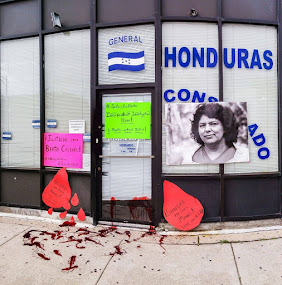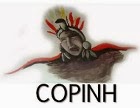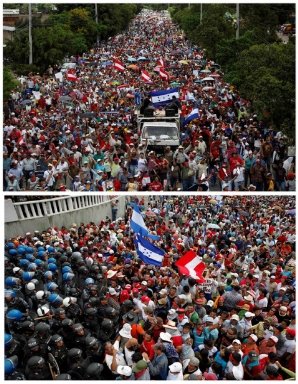The court session today continued to reflect an atmosphere of conflict with the judges clearly violating the principal of impartiality, restricting the ability of the defense lawyers to defend Chabelo.
Despite constant interruptions from the lead judge (" speak louder, speak slower, speak into the microphone, look at me when you answer not at them, etc. "), all three were able to explain that Chabelo was at the soccer field at 4pm for a soccer game and that he only left the field after the wife of his friend Arnulfo Guevara came running to the field to say that she was told that her husband had been killed near Henry Osorto's house and that she needed Chabelo's help to go get Arnulfo's body. The soccer field is some distance from the Osorto house.
 |
| Henry Osorto- photo El Diario Olancho |
The judge also interrupted the defense lawyer when she was questioning her witnesses. She also noted for the record that the judge was interrupting the defense witnesses, something he had not done with the prosecution witnesses.
The defense team has also complained that the judges should have taken action in the face of prosecution witnesses changing their testimony from their original statements and testimony - for making false statements to the court. Instead the Tribunal has so far denied the defense the right to contest the contradictory statements or to even contrast the different versions in court so far.
One testimony was changed so that it actually supports the timeline as Chabelo (and defense witnesses) have testified of Chabelo arriving late in the day not during the main confrontation; another testimony was changed to accuse Chabelo of shooting and then attacking with a machete the witness's uncle when previously he said it was someone else and he now says that Chabelo was organizing the attack and agitating the other campesinos. (This is clearly contradictory to all the other testimony as well as to this witness' previous testimony.
The Coordinadora of Popular Organization of the Aguan (COPA) brought a bus load of supporters to maintain the vigil in support of Chableo. The Permanent Observatory for Human Rights in the Aguan and several international observers also maintained their presence.
The trial reconvenes Monday morning.
 |
| January 30- Chabelo, his mother, his lawyer, representatives of ERIC SJ, Task Force on the Americas and La Voz de los de Abajo |


























